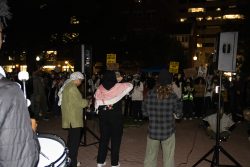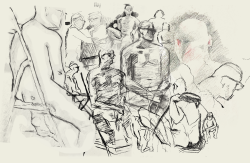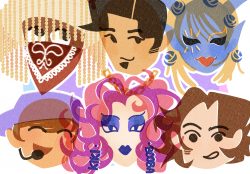When President John J. DeGioia is out of town, Provost James O’Donnell is responsible for greeting dignitaries that visit Georgetown. While an honor, it occasionally leads to a bit of confusion, like when a certain Governator spoke on campus. The provost greeted California Governor Arnold Schwarzenegger in the parking garage, exchanging handshakes and introductions.
“Thank you very much, happy to be here,” Schwarzenegger said, according to O’Donnell. “Now, what is provost?”
But really, what is “provost?” Most Hoyas will never deal with O’Donnell directly, and few may even hear his name unless they’re paying attention. But last February, when snow shut down campus and the hill by Village C became a sledding hotspot, the provost made a name for himself as the man who took away President’s Day. At least that’s the way the more vocal opponents of the decision put it. But the fact is, while deciding whether the campus is open or closed is O’Donnell’s job, it is only a minor detail in the job description of one of the most misunderstood administrators on campus.
Although “provost” may not mean much to anyone but Latin scholars, the job can be summed up rather simply. The provost is a high-ranking university official in charge of all things academic. The deans, the registrar, the Office of Student Affairs, the Office of Financial Aid, the University budget all fall under his jurisdiction. He is also active in initiatives that take place across schools within the University, particularly international programs. Describing his own job, O’Donnell uses the metaphor of a corporation: If DeGioia is the CEO, setting the strategy for the institution, then the provost is the COO, managing day-to-day activities and keeping Georgetown on course. Or, as O’Donnell described it in an October 29, 2009 Voice article, he “makes the train run on time.”
As for the fancy name?
“We had to use an old Latin word for it to make it sound impressive enough for academics,” O’Donnell told me, laughing.
Far more interesting than what the provost does, however, is who the provost is. O’Donnell came to Georgetown in 2002, already an established scholar and administrator. After graduating from Princeton in 1972 and earning a Ph.D. from Yale in 1975, O’Donnell began a career as a classics professor that would lead him to Bryn Mawr, Catholic, Cornell, and Penn. Over the years, he has published multiple books and dozens of articles on history and philosophy.
Although O’Donnell’s academic pursuits are very dear to him, he is not one to be pigeonholed. His passions are diverse and unique; they paint a much broader picture of the man who sends out e-mails when it snows.
Jim O’Donnell is no Luddite
It would be easy to assume that a classics professor would shy away from modern computing innovations, content instead with reading aging texts by lamplight. Quite the contrary, O’Donnell found himself embracing technology early on in a way that many of his peers did not. In 1990 O’Donnell helped start the Bryn Mawr Classical Review, an electronic journal of book reviews, along with his colleague Richard Hamilton. At the time of its inception, the Classical Review was one of only two e-journals devoted to the humanities. Today there are hundreds.
It was this progressive approach to education that brought O’Donnell to the attention of then-Pennsylvania University Executive Vice President John Fry in 1995. When Fry established a task force to overhaul Penn’s computing systems, O’Donnell was asked to head it. And when O’Donnell excelled in that position, he was given the job of Vice Provost for Systems and Computing, a position that Fry had planned to fill from outside the university. O’Donnell proved to be a sound leader.
“It was frankly one of the best personnel decisions I ever made,” Fry said, “because I felt like he was a guy who clearly had a big career academically and didn’t need to be in administration, but who clearly had a gift. And it worked out great.”
Jim O’Donnell can quote Winnie the Pooh
Although it’s been eight years since the two worked together at Penn, Fry, who is now the president of Franklin & Marshall, still speaks fondly of O’Donnell. He remembers one time in particular, when O’Donnell likened a situation at work to a Winnie the Pooh story that Fry had been reading to his children. He was struck by both the accuracy of the comparison and the insight with which it was delivered.
“He would know a story that would relate to a situation,” Fry said. “And he would know that—in the case of Winnie the Pooh—that he knows I have little kids, and knows I’m spending a lot of my time with all those books.”
This sort of moment highlights O’Donnell’s strengths. His knowledge bank ranges from Winnie the Pooh to St. Augustine of Hippo to old Doonesbury comic strips and—not unlike a computer—he can draw on the most applicable piece of information depending on the situation. It may be surprising, a respected academic drawing wisdom from a children’s story, but O’Donnell doesn’t shy away from insight, whatever the source.
“This guy’s intellectual capacity is huge,” Fry said. “And, you know, people thought that was quirky. I thought that was really cool, that he could put things in certain terms and certain ways that would most precisely describe things. It’s way more than any of us could do.”
Jim O’Donnell does not think Hitler is funny
In the wake of the announcement that classes would be held on President’s Day, Georgetown students expressed their opinions in different ways. Some quietly accepted the change, appreciating the opportunity to get back on track. Others raged on Facebook and blogs about the unjust theft of a federal holiday. While the provost stands by his decision to offer classes, one student’s reaction did get his attention—a YouTube video posted by Georgetown internet-celebrity KingGeorgetown titled, “The Downfall of Liberal Leave.”
The video uses footage of an enraged Adolf Hitler in his bunker during the final days of World War II, taken from the 2004 German film Downfall. While the Führer rants, invented subtitles explain that he is livid about the provost’s decision to declare liberal leave, as it will interrupt his plans to go sledding and play in the snow.
O’Donnell’s response to the video was diplomatic and measured, quite the opposite of the outburst depicted.
“I thought the Hitler video was interesting. I’m not sure I ever think Hitler is funny about anything,” he said. “And I guess the other thing I would say, though—and I guess this does make a little bit light of it—is that if Hitler is against me, I’m not real worried. When there’s a video that shows that Hitler is supporting me then maybe I’ll start worrying about what my policies are.”
Jim O’Donnell has the blessing of the Man with the Mace
As provost at Georgetown, one of the many administrators that works closely with O’Donnell is the registrar, John Q. Pierce—perhaps better known to many as the man who carries that big mace during convocation. Pierce is as blue and gray as they come: He graduated from the College in 1972, became the registrar in 1983, and boasts three Hoya sons—two graduated, one current. He holds Georgetown traditions to be sacred, and highly respects the Jesuit tradition. While O’Donnell has only been a faculty member for a fraction of the time he has, Pierce sees that O’Donnell knows exactly what it means to be a Hoya.
“I’ve been very impressed with the extent to which he has grown to know and appreciate Georgetown in the relatively short time he’s been associated with the university,” Pierce said. “He has come to appreciate the people who make up the university and the traditions of the university in an absolutely remarkable way.”
Pierce is particularly impressed with the sensitivity and tact that O’Donnell shows with the rest of the faculty. Should a faculty member pass away, the provost is always there, reaching out and offering support to the rest of the staff.
Pierce also respects O’Donnell’s sense of the University’s Jesuit mission—something O’Donnell attributes largely to his Jesuit high school education. After a number of Jesuits volunteered to proctor exams for absent professors during last semester’s final exam snowstorm, O’Donnell sent an e-mail to the entire faculty praising the Jesuits.
“He wrote a mass e-mail to the faculty that weekend talking about the Jesuits who had come through for us all in terms of ‘magis,’ which is a Jesuit concept of always striving to do more for the common good,” Pierce said. “He couched the praise for the Jesuits in Jesuit terms.”
Jim O’Donnell is a roving chocolate correspondent
Amidst the slew of academic papers, scholarly reviews, and dense historical texts that O’Donnell has published, there are a handful of delightful surprises. One such treat, linked proudly on his personal website, is a 2006 article published in Chocolatier, a magazine devoted to that delicious confection. The article, entitled “Endless Quest,” chronicles the ongoing adventures that O’Donnell shares with his wife, searching across continents for the world’s most decadent chocolate. The piece is about the balance between cultural and culinary exploration, all made sweeter by virtue of the fact that he shares these adventures with his wife.
Though it may seem trivial, the cultural awareness O’Donnell shows when talking about chocolate falls directly in line with how understanding cultural differences help him perform as provost. When asked about his chocolate hunting, O’Donnell puts it in a broader perspective.
“The chocolate is chocolate, but is also connected,” he said. “I find it exhilarating and fascinating to travel widely … I think our institution is wrestling hard with figuring out what it is to be a great national and international and global university in a world that is far more egalitarian, far more diverse, and far more complicated than ever before. So when I get a chance to go to someplace like Nepal, or India, or South Africa, I jump on it because I think I’m going to do a better job back here if I’ve met some people in those countries, if I’ve tried to understand something about the education there.”
While this idea guides him as he travels, he also enjoys travel for much simpler reasons.
“I think that also keeps me sane and just gives me perspective,” he said. “I mean, you can spend too much time in the office.”
As for his status as the only Georgetown administrator with the coveted title of Roving Chocolate Correspondent, O’Donnell sees his work as far from done.
“It’s a dirty job, but somebody’s got to do it,” he said. “I’m actually in training to add ‘and cupcake’ to that.”
Jim O’Donnell respects donkeys
In many ways, the provost’s office is not very different from that of any other senior administrator. It is large and tastefully decorated with dark woods and earthy colors. Some artwork hangs on the walls, and the bookshelves are stocked and ordered. It is much like any other senior administrator’s office—that is, if you ignore the life-sized donkey statue that sits dead center, facing O’Donnell’s desk like a watchful taskmaster. In fact, O’Donnell joked that he has been much more productive ever since the donkey showed up and started supervising him.
The statue, however, which is painted brown and illustrated with books, is not there as a joke. O’Donnell is fascinated by donkeys. When I asked him how this came to be, O’Donnell responded incredulously.
“Well, how not?” he said. “They’re very intelligent, very hard working. Civilization wouldn’t have happened as it has … if it weren’t for the donkeys who worked and still work very hard all the way around the world.”
From his personal website, O’Donnell links to a website for an international organization that he supports called The Donkey Sanctuary. The Donkey Sanctuary rescues mistreated and abused donkeys from around the world and brings them to be rehabilitated and looked after.
“[Donkeys] are very intelligent, very hard working, and don’t get as much respect as they deserve. So I guess I would say I’m in the respecting donkeys business.”
Jim O’Donnell is our provost
In a somber moment, Pierce shared a moving encounter he had with O’Donnell. When Daniel Rigby died tragically of a fire in October of 2004, the entire Georgetown community felt the loss. Rigby’s death was particularly hard for Pierce and his wife, he explained, because in addition to the incredible sadness they felt for the Rigby family, they had to face the fact that their own son Patrick had lived only three months earlier in the very same room where Rigby died. Rigby and Patrick had known each other from the rugby team, and Patrick had given Rigby his room. Pierce didn’t expect anyone else to make that connection, he explained, and thought it was something for his family to deal with alone. But then, unexpectedly, they received a call from O’Donnell expressing understanding and compassion for how they felt.
“That’s just a little thing,” Pierce said, “but it shows that he cares about people.”
Despite all of his quirks and eccentricities, his passions and projects, O’Donnell mostly stays behind the scenes. He remains to many a name in an e-mail. But maybe that’s not a bad thing.
“Dr. O’Donnell works in an understated sort of way, and so if you don’t need to see him and explicitly experience his leadership, then you won’t,” Pierce said. “But, he’s very much involved in everything. And in some ways you have to admire someone who is in a very prominent position whom nevertheless works behind the scenes and subtly.”
While the masses may never notice O’Donnell, his colleagues can hardly forget his greatness. His former boss, Fry, made a simple prediction.
“I think one day he will be the president of a great university. No doubt.”





Delightful article about a delightful guy!